A ragtag group of backwater extremists have risen to international media heights and challenged the peace of mind and collective safety of the free world. Generally speaking, most people know little about them. A dangerous position, and if one man is historically noted as an expert on that point, it is Sun Tzu. In his classical masterpiece, the “Art of War,” Section III, Attack by Stratagem, he tells us, “If you know the enemy and know yourself, you need not fear the result of a hundred battles. If you know yourself but not the enemy, for every victory gained you will also suffer a defeat. If you know neither the enemy nor yourself, you will succumb in every battle.” Simply put, know your enemy.
What’s in a name
One notable concern regarding this understanding of our enemy is that we cannot seem to simply agree on what name to call them. The Islamic State in Iraq and as-Shām are also commonly known as ISIS, IS, ISIL, or DAIS (pronounced Daesh). The lattermost is based on the acronym of their latest name, Dawlat al-Islāmiyya fī al-Irāq wa s-Shām. Simply put, beyond the most popular term used, ISIS, we should be calling them Daesh, as it’s perceived by the enemy as a derogatory term. Kurdish coalitions have been using the term Daesh for the majority of the conflict.
Also, if one considers the title Islamic State, it provides a sense of statehood, sovereignty, and recognition as one would bestow upon a nation. The free world has not bowed to such a thing and Daesh, a group of terrorists who conquer by way of fear and slaughter, should not be presented with any such honors. There are also reports that anyone using the term Daesh, if overheard by them, “will have their tongues cut out.”
So fuck those guys. Daesh it is.
We should be using Daesh, because it is always best that your adversary understands you when insulting them. The derogatory meaning is found in the Arabic verb سعد , meaning to “tread underfoot, trample down, or crush.” There is another root which refers to the Jāhiliyya (pre-Islamic) conflict between two Arab tribes on the Arabian Peninsula, ءاربغلاوسحاد – Dāhis wa’l-Ghabrā’, which can be literally translated as “felon and dust.”
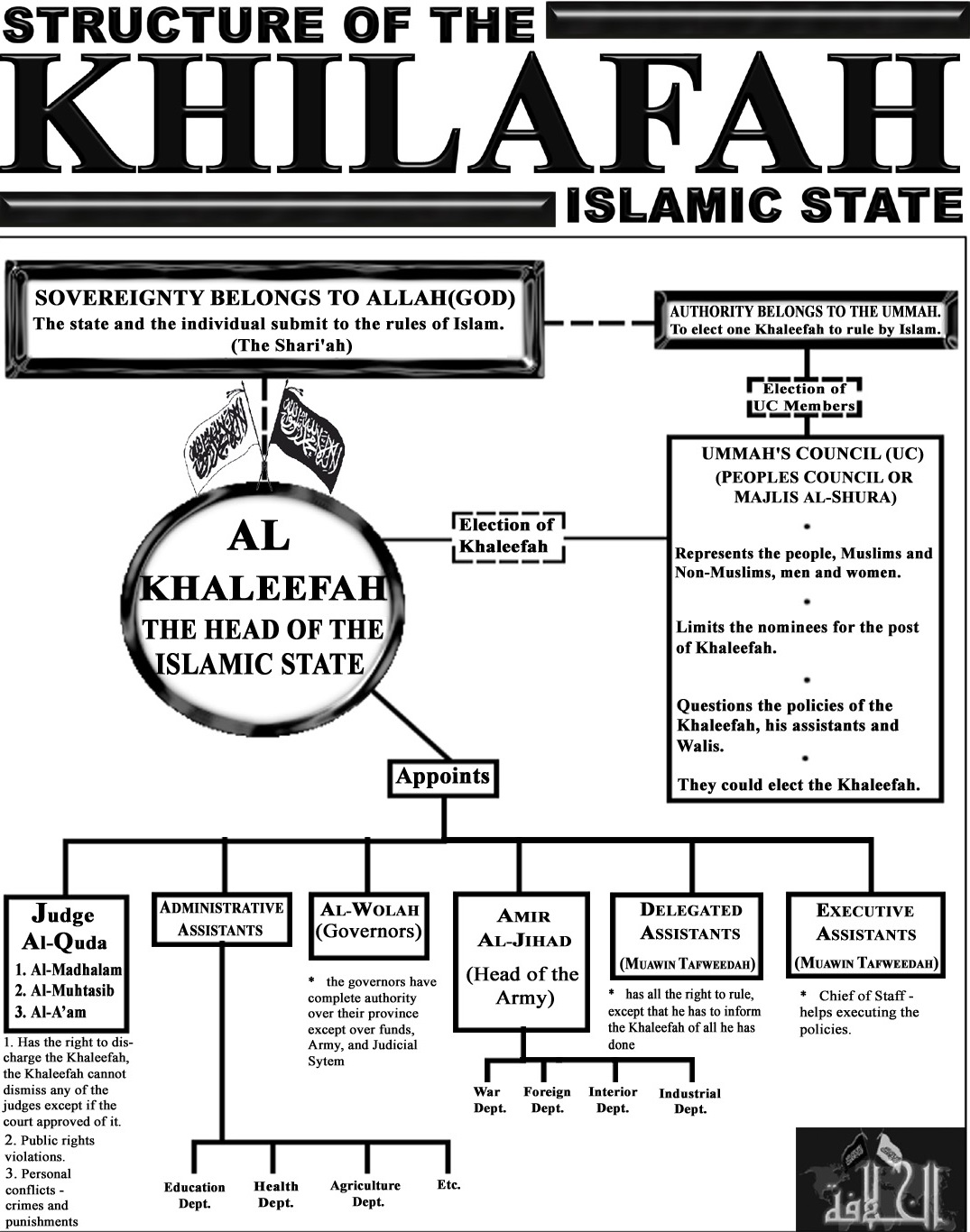
Ideological roots
The so-called Islamic State (IS), or Daesh as they will henceforth be referred to, is a jihadi-Salafi militant organization in Syria and Iraq whose primary goal is the establishment and expansion of an Islamic caliphate under harsh Sharia Law. The caliphate is an antiquated concept and a fine example of failing the future by reverting to the past. The notion of the caliphate arose after Muhammad died in 632 A.D., and the court that centered on his seat of power was left to figure out what to do.
Muhammad’s self-centralized governance presented a serious dilemma for the new policymakers of his empire: Who was to succeed a man they considered the prophet of Allah? The only working model for their military and political complex was based on a sole leader allegedly under the authority of Allah. Prior to Muhammad’s death, there was little publicized thought as to who was to succeed his throne. After conflict and debate, Muhammad’s father-in-law, Abu Bakr, was christened the khalifah or “successor” of Muhammad. This move brought about the evolution of Islam and the political/social construct, the caliphate.
The modern caliphate is essentially a representation of the old ways of Islam, so it should come as no surprise that religious fundamentalist zealots are committing acts of terrorism and murdering innocents in effort to return to it. The Islamist following that is leading this and is at the core of Daesh is Salafism. Salafi comes from the Arabic expression ‘as-salaf as-saliheen,’ in reference to the first three generations of Muslims, also known as the Pious Predecessors. Salafis believe in a centuries-old Sunni conservative teaching which was developed to emulate the teachings of Muhammad. The teachings of Salafism have no recognized established hierarchy within Islam, although the movement has been growing in numbers and lethality in China, Egypt, France, Germany, Iraq, Sweden, Syria, and the UK.

The group that has now spread like a plague on the earth has some of the most abstract origins, which date back to 1999 and stem from an obscure militant group, Bayat al-Imam. This group was organized by a Jordanian named Abu Musab al-Zarqawi, who was initially trained by veterans of the Afghanistan mujahedeen after the Soviet incursion of the 1980s. The fighting with the Soviets was over shortly after he arrived in Afghanistan. With no one left to fight, he then found himself in Pakistan, where he adopted the Salafi religious ideology under the training of Sheikh Abu Muhammad al-Maqdisi. Thus began the radical religious ideology that he would eventually transplant into modern-day Daesh.
Zarqawi’s legacy
Zarqawi sought to continue the fight and lead his homeland against the Jordanian government. He failed miserably, and was then imprisoned. While in prison, Zarqawi radicalized further and regularly smuggled out statements via his followers to be posted on the Internet. His online postings allegedly caught the attention of Osama bin Laden. After his defeat and imprisonment, he was invited to return to Afghanistan, where he operated from a Taliban militant training camp near Herat. His stay was short-lived. After sustaining an injury while fighting alongside al-Qaeda and Taliban fighters against the U.S.-led invasion of Afghanistan in 2001, he fled to Iran. There, he shifted his foundations and by 2003, he was in Iraq.
Using his network from Afghanistan, he acquired the funding and training needed to combat American and coalition forces in Iraq. There, he reorganized his old Salafi terrorist group, Bayat al-Imam, as Jama’at al-Tawhid wal-Jihad. They targeted American and coalition forces, aid workers, and civilians in a string of guerrilla attacks and suicide bombings. In 2004, Zarqawi came to an agreement with al-Qaeda, despite his ideological and targeting disagreements with them. Zarqawi took the money and developed a new name for his organization: Tanzim Qaidat al-Jihad fi Bilad al-Rafidayn, or al-Qaeda in Iraq (AQI).
As any soldier in the field from 2004-2006 knows, Zarqawi and his militants were infamous in the region. His wanted listing often showed him brandishing a M249 SAW. The militants under Zarqawi’s command became a major asset to the Iraqi insurgency throughout Operation Iraqi Freedom (OIF), and remained in the fight after his death from a U.S. airstrike in 2006. His death did not slow the group’s growth. In 2006, they combined forces with five other Iraqi-based insurgency groups: Jaish al-Ta’ifa al-Mansurah, Katbiyan Ansar Al-Tawhid wal Sunnah, Saraya al-Jihad Group, al-Ghuraba Brigades, and al-Ahwal Brigades, forming the Mujahideen Shura Council (Iraq). This umbrella group was a consolidation of various terrorist organizations in Iraq to unify power and create the deadly foundation necessary for Daesh to exist as it does today.
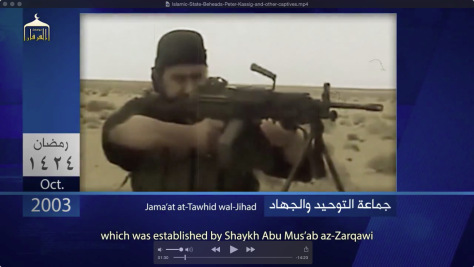
By October, Zarqawi’s replacement emerged: Abu Omar al-Baghdadi. On the 13th of October, 2006, he proclaimed the establishment of the Islamic State of Iraq (ISI) and his new role as emir of the ISI. He forecasted carnage at the time, but we didn’t take him too seriously, “God willing, we will set the law of sharia here and we will fight the Americans.” Through another difficult counterinsurgency/terrorism lesson akin to eating soup with a knife, we eventually took action. Al-Baghdadi was killed during an April, 2010 raid by American forces—nearly four years after his initial proclamation.
Global ambitions of madmen
A month later, in May 2010, Abu Bakr al-Baghdadi was declared the new emir of ISI, and has remained in power through the group’s mutation into Daesh. Al-Baghdadi began his reign by appointing Ba’athist Party military and intelligence officers to senior positions within ISI. Many of these men became Baghdadi’s top commanders. Most noteworthy of them is a former colonel from the Saddam Hussein regime, Samir al-Khlifawi, later known as Haji Bakr. Bakr was influential as the overall military commander, overseeing the strategy that led to the expansion of Daesh.
Zarqawi empowered his followers with a new, unique variety of a radical Islam, providing a fundamentalist base for Daesh to build on. Daesh, like al-Qaeda, has demonstrated hostilities toward Shi’ites, whom Zarqawi regularly referred to as “human scum.” Both Daesh and al-Qaeda have also shown an insane level of paranoia, propagating conspiracy theories such as, the Shi’ites, with the help of pro-American Sunnis, are in a confederation to establish a Shi’ite regime in Iraq, which would be anti-Sunni and pro-American.
Theirs is a legacy of lunacy, rooted in non-figurative interpretations of Arabic Islamic sources, often presented in audiotape rants. These rants, unfortunately, hold merit for Daesh and the followers of al-Zarqawi. It is what they consider a matter of “Islamic legitimacy” to attack Shi’ites, the Iraqi government, the West, and anyone else not subscribing to their brand of crazy. Though Zarqawi was not alive for the formation of Daesh or even the ISI, his intent to use hateful preaching and acts to bring about a Shi’ite-Sunni civil war to destabilize the region and present an opportunity to seize power remains in play. Daesh considers him part of their legacy and reveres him as a role model, having named a training base in Al-Raqqah, Syria, after him and with youth organizations under Daesh control in Iraq and Syria named “al-Zarqawi’s [lion] cubs.”
Into Syria
Zarqawi’s importance to the foundation of Daesh is proven by his logistical dealings, as he was able to organize the initial contacts for AQI, which were followed up on and leveraged by ISI, and eventually Daesh, to operate freely in Syria through the development of a covert operational infrastructure. His initial grassroots campaign in Syria relied on the resentment of American and coalition forces in Iraq, and sought operational logistics such as munitions and weapons.
This network eventually became a pipeline for foreign fighters to enter the fight in Iraq in support of terrorist activities in the region. The network went as far as establishing guesthouses in which recruitment and propaganda activities were based throughout Syria. These guesthouses went mostly unchecked, as Syrian President Bashar al-Assad’s government was failing. The guesthouses eventually metamorphosed into launching points for militia operations and training facilities, which would directly assist in the further destabilization of Iraq and Syria.
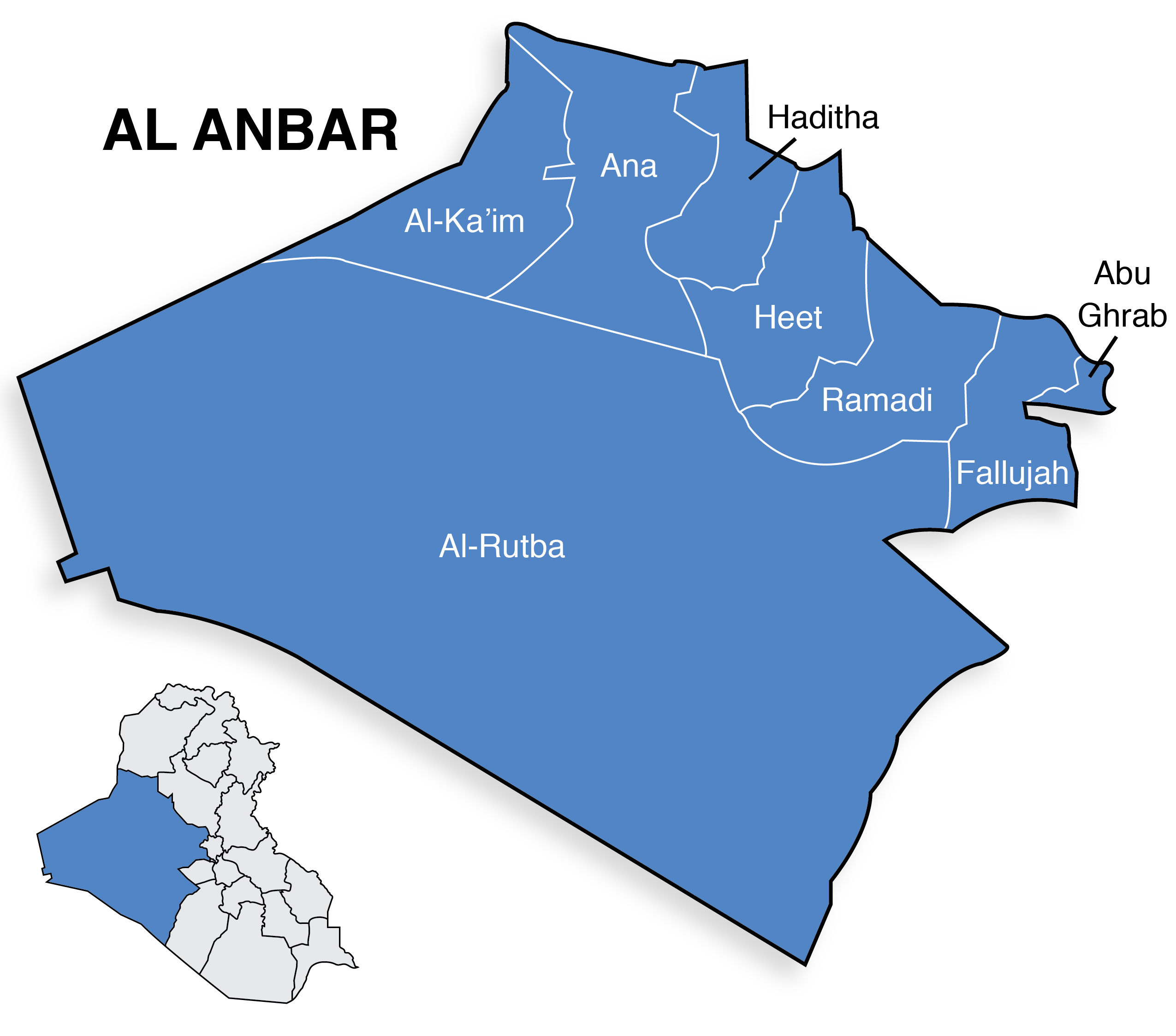
The terrorist campaign led by ISI in 2010 was operating, by local standards, as a well-established organization that principally conducted acts of terror in and around Baghdad and in western Iraq. In western Iraq, Al Anbar Province, which extends to the Syrian border, has a significant tribal Sunni presence. Attacks in Al-Anbar throughout 2006-2007 targeted the United States and those loyal to it, or those seen as an accomplice to the accused Shi’ite-affiliated Iraqi government.
ISI set about establishing a civilian administration within the Sunni population in the areas under its influence, in direct contradiction to the Iraqi government. These activities resonated with the local Sunni population in those regions. The Sunnis felt abandoned by the Iraqi government and the United States, and initially resisted ISI presence in local leadership. It wasn’t long before the majority felt empowered by ISI. As a result, Daesh now holds a firm societal and political power base in western Iraq, with growing support from radicals in Baghdad.
In 2011, ISI was facing criticism from the public they sought to represent. Coupled with improved security from U.S. and Iraqi forces, ISI was rapidly declining. That is until opportunity arrived on its border in a destabilized Syria. ISI augmented itself by way of the turmoil in Syria, awaiting the scheduled withdrawal of American forces in December, 2011.
After a hibernation period, ISI rose in the wake of a dramatic reduction in security forces and a breakdown of service and support following the U.S. withdrawal and subsequent Iraqi political tensions. ISI dispatched jihadi veterans from OIF into Syria to take part in the insurrection against the Assad regime. By January, 2012, they had covertly established the Al-Nusra Front (“support front”) in Syria under Abu Muhammad al-Julani, who believed his operations to be separate from those of ISI. This was the group’s first power play outside of Iraqi borders.
Destabilizing Iraq
By 2012, incidents of ISI terrorist activities had ominously increased. In December, Sunnis in Al Anbar Province began demonstrations against the policies of the Iraqi Prime Minister, Nouri al-Maliki, blaming his religious affiliation as a Shiite for many of their grievances. In response to the protests, Iraqi security forces invaded protest camps, prompting Sunni attacks against Shi’ites and fostering support for ISI.
The breakdown in civil order allowed al-Baghdadi to carry out two successful terror campaigns in Iraq. In 2012, the “Breaking Walls” campaign besieged the Maliki government and orchestrated prison breaks. This was followed by a 2013 operation morbidly named “Soldier’s Harvest,” which specifically targeted Iraqi security forces. The Iraqi government, in response, dispatched Iraqi security forces to clear an encampment of protesters in the city of Ramadi, Iraq in late 2013, but the move was too little, too late, as a localized uprising forced Iraqi security forces out of the encampment and out of the bulk of Al Anbar Province. This provided ISI with the space needed to grow into a global threat.
From here, ISI increased their gains and leveraged the Syrian Civil War to train their fighters, stealing anything of value in the process. Fermenting in ill-gotten lands and treasure, al-Baghdadi, in April, 2013, formally announced ISI’s international ambitions by changing the organization’s name to the Islamic State of Iraq and Al-Sham, the beginning of all the name confusion mentioned at the beginning of this article. But, as mentioned, they don’t like to be called Daesh, so let us continue to call them Daesh.
No longer an al-Qaeda franchise
In al-Baghdadi’s proclamation, he claimed to have been responsible for the creation of the Syrian terrorist organization known as al-Nusra in Syria, and claimed ownership of that organization. Al-Qaeda’s Ayman al-Zawahiri overruled Baghdadi’s claims and further ordered Baghdadi to limit his organization’s operations to Iraq. In response, on June 14, 2013, Baghdadi released a public statement rejecting Zawahiri’s orders. After ignoring several calls for mediation, and unsuccessful efforts for appeasement with al-Qaeda leadership, ISI and al-Qaeda officially disowned one another in February of 2014. ISI officially began operations as Daesh, initiating its quest for a caliphate in earnest.
Daesh’s divorce from al-Qaeda made it more power-hungry. The group grew rapidly in size and power following military offensives in Iraq and Syria. Unchecked, it has achieved steady success, continuing to give the governments of Iraq and Syria, tribal groups and militias in Iraq, the Kurdish Peshmerga, and several rebel and militia organizations in Syria a run for their money. Daesh’s hefty land grabs began in January 2014 following their first major victory against Iraqi security forces in which they seized the city of Fallujah. In June, Daesh conquered Mosul and again swept aside Iraqi security forces.
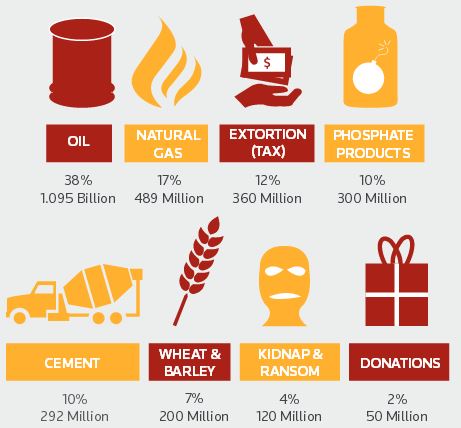
Plundering land and money, Daesh acquired the assets and means to multiply its revenue stream from one million to three million dollars a day. They have an estimated annual income of two billion dollars. Annual reports released by Daesh reveal a fortune seized through conquest, fortified by foreign donors and from criminal activities such as extortion, ransoms, the resale of stolen military equipment, smuggling, and taxation of those caught in their dominion. The black market distribution of Daesh’s oil in Iraq and Syria alone is estimated to generate between one million and two million dollars per day.

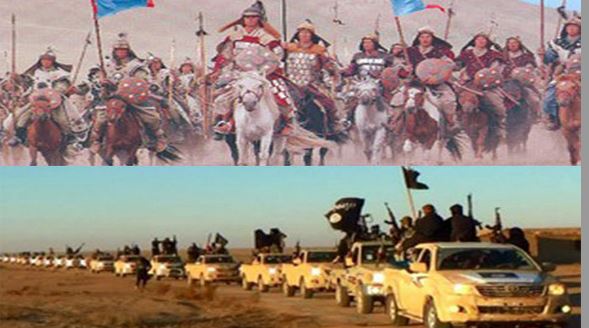
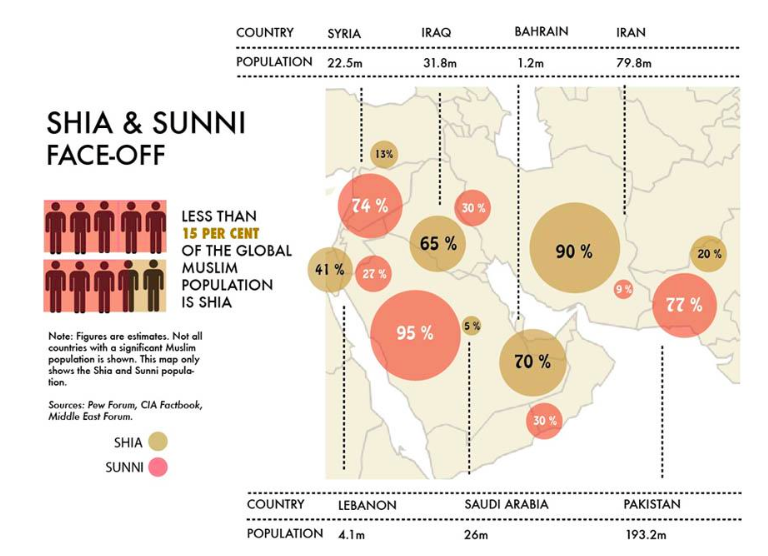








COMMENTS